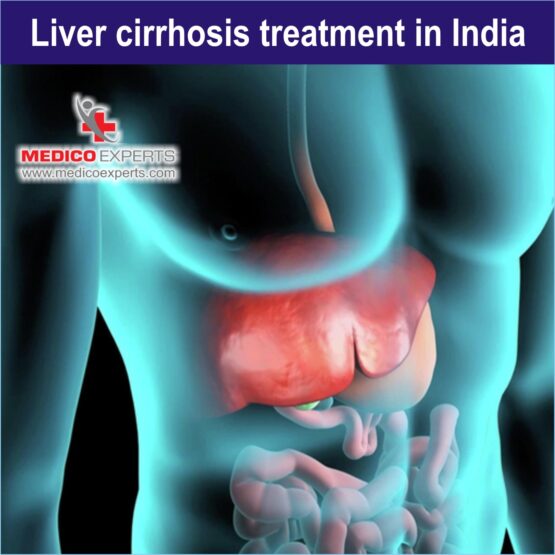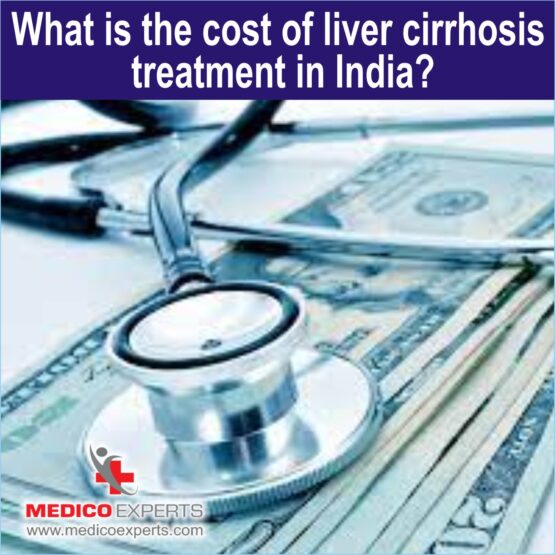Hope and Healing: The Best Liver Cirrhosis Treatment in India
Your liver health is extremely important for your overall well-being. The liver performs many jobs including producing important substances for your body, removing waste products, controlling immune responses, and maintaining your glucose levels.
When your liver is not working properly your body will also have problems in functioning well and if you have liver cirrhosis, things can really go downhill.
Unfortunately, globally liver cirrhosis cases are increasing every year. In 2017, the new cases of liver cirrhosis and chronic liver diseases were 520000. However, in 2019, 1.48 million people died due to liver cirrhosis, an increase of 8.1% compared to 2017,
The data shows how important it is to get proper treatment for liver cirrhosis on time. India is one of the best countries to get the treatment done as the country offers you world-class health service at a reasonable cost.
Before you learn about all the details on getting treatment in India, let’s first understand what is liver cirrhosis, how it can damage your overall health, and most importantly how to treat it.
Abdul, a 45-year-old man from Ghana, had been living a peaceful life in the vibrant city of Accra. He was a schoolteacher. However, deteriorations in his health changed his life completely. Abdul had been diagnosed with liver cirrhosis, a condition that threatened to turn his world upside down.
As the days passed, Abdul’s health further deteriorated, and he found himself in constant pain. The local doctors in Accra had provided him with initial treatments, but his condition demanded specialized care. His family was worried, and his students missed his engaging lectures.


One day, while searching online for potential solutions, Abdul stumbled upon a website called MedicoExperts. The homepage was filled with reassuring words about quality healthcare at affordable prices. Intrigued, he clicked on the link and began reading about their mission.
Abdul had always believed that health was the most important part of life, and he refused to compromise on the quality of his treatment. Yet, with his modest teacher’s salary and the mounting medical bills, he had been anxious about making the right decisions.
As he did more research on the organization, Abdul learned that MedicoExperts had a network of highly skilled doctors who were masters of their super-specialties. These doctors were carefully selected based on their success rates, ensuring that patients received the best care possible. Furthermore, MedicoExperts has partnered with various hospitals in India, each offering different price points to suit patients’ budgets.
Abdul decided to take a leap of faith. He contacted MedicoExperts through their online portal and shared his medical records. Within a short time, he received a response from the team.
With the guidance of MedicoExperts, Abdul and his family made the journey to India. They were welcomed at the hospital, where a team of compassionate healthcare professionals made them feel at home. Abdul underwent a successful liver transplant surgery and his recovery was swift.
Abdul’s journey with MedicoExperts not only saved his life but also inspired him to spread awareness about affordable healthcare options.
Like Abdul, you too can completely get rid of liver cirrhosis if you get the right treatment. So let’s know about it more.
What are the symptoms of liver cirrhosis?
In this initial stage of liver disease, there’s inflammation in the bile duct or liver. The first sign of inflammation is often abdominal discomfort, as the body fights against the disease or infection. If not managed, this inflammation can harm the liver, making the illness worse. Symptoms and inflammation can usually be treated in stage I, preventing the disease from progressing to stage II.
Due to Inflammation, Many people don’t realize they have liver disease until stage II or III since early symptoms often go unnoticed. In stage II, scarring or inflammation starts to block the normal blood flow in the liver. This impairs the liver’s function, but with treatment, it may still recover and slow down the disease’s progression.
Cirrhosis occurs as liver disease advances, often due to a lack of treatment, replacing healthy liver tissue with scar tissue. This happens when a progressive illness or infection destroys healthy liver cells over several years. The liver becomes hard and lumpy due to permanent scarring, making it unable to function properly. As scar tissue grows, blood flow through the liver becomes impossible, leading to complications like spleen issues.
Liver failure in the final stage of the disease means the liver can no longer function, requiring urgent medical intervention to prevent fatalities.
What are the treatment options for liver cirrhosis?
If cirrhosis is caused by conditions like viral hepatitis or alcohol abuse, the primary focus is on treating and managing those underlying causes. This may involve antiviral medications for hepatitis or alcohol cessation programs.
Your healthcare providers may prescribe medications to alleviate symptoms and complications of cirrhosis. For example, diuretics can help manage fluid buildup (ascites), and beta-blockers can reduce the risk of variceal bleeding.
Lifestyle modifications are crucial, especially in alcohol-related cirrhosis. Abstaining from alcohol and adopting a healthy diet can slow down the progression of the disease.
Cirrhosis can lead to malnutrition. Dietary adjustments and sometimes nutritional supplements may be recommended to ensure adequate nutrition.
In cases where varices (enlarged blood vessels) are present, a procedure called banding can be performed to prevent them from bleeding.
Stem cell treatment for liver cirrhosis is an emerging field of research and therapy. It involves the use of stem cells, often derived from the patient’s own body or from donors, to promote liver regeneration and repair damaged tissue.
In India, stem cell therapy has demonstrated promising results for a range of severe illnesses that do not typically respond to conventional treatments. These positive outcomes are attributed to the unique and remarkable properties of stem cells.
For advanced cirrhosis with liver failure, a liver transplant may be the only option. This involves replacing the damaged liver with a healthy one from a donor.
Cirrhosis can lead to various complications such as hepatic encephalopathy (confusion due to liver toxin buildup) or hepatorenal syndrome (kidney dysfunction). These require specific treatments.
Regardless of the treatment chosen, regular medical check-ups are essential to monitor the progression of cirrhosis and adjust the treatment plan as needed.
Those who are suffering from fatty liver cirrhosis can reduce liver inflammation and fibrosis by losing 7% to 10% of their body weight. Also, you need to avoid alcohol completely.

Liver cirrhosis treatment in India
Are you planning to come to India for liver cirrhosis treatment?
If yes, you have made the best decision of your life.
India has some of the best gastroenterologists (specialists who treat all the organs in your digestive system, including your GI tract (esophagus, stomach, and intestines) and biliary organs (your liver, bile ducts, pancreas, and gallbladder) and hepatologists (specialists who diagnose, treat, and manage problems related to your liver, gallbladder, pancreas, and bile ducts).
Apart from the low cost of treatment, easily available medical visas, very short waiting periods for international patients, and high success rates of treatments and procedures make India a lucrative destination for medical tourism.
The country also has multispeciality hospitals with cutting-edge technology. Some of the best hospitals to treat liver cirrhosis are
- Kokilaben Dhirubhai Ambani Hospital, Mumbai
- Jaslok Hospital, Mumbai
- Apollo Hospital, Greams Road, Chennai
- Indraprastha Apollo Hospital, Delhi
- BLK Super Specialty Hospital, Delhi
- Fortis Hospital (Bannerghatta Road), Bangalore
- Manipal Hospital (Old Airport Road), Bangalore
MedicoExperts is a “Global Virtual Hospital” established to offer quality healthcare services at affordable prices without compromising the success rates of the treatment.
MedicoExperts can connect you to a worldwide network of extensively experienced super-specialist physicians and well-equipped hospitals. We provide second opinions via online video consultations and perform surgical procedures with their panel of super-specialist doctors at hospitals in 17 countries spanning three continents.
What is the cost of liver cirrhosis treatment in India?
The cost for liver cirrhosis treatment comes to approximately between 88800 INR ($1,069.42) and 120000 INR ($1,445.23).
The cost range for a Liver Transplant in India is as follows:
- The minimum price begins at 10,00,000 INR ($12,043.75).
- The average cost is approximately 28,00,000 INR (33,723.80).
- The maximum expense can go up to 32,00,000 INR (38,541.49).

Final Words
To sum up, you cannot overlook the importance of liver health, as it plays a crucial role in your overall well-being. Liver cirrhosis is a serious condition that can have devastating effects if left untreated.
From initial inflammation to advanced liver failure, recognizing the stages can help you in early intervention and management.
The MedicoExperts team is always ready to help you in your treatment journey. The only thing you need to remember is that we are a click away from you.
Frequently Asked Questions and patient concerns:
Q1. Is Liver Cirrhosis permanent?
Liver cirrhosis is generally considered permanent, as it involves irreversible scarring of the liver tissue. However, early intervention and management can slow its progression and prevent further damage, improving your health.
Q2.Can a liver fully recover from cirrhosis?
The liver can partially recover from cirrhosis if the underlying cause is treated effectively, such as stopping alcohol consumption or managing hepatitis. However, complete reversal of cirrhosis and restoration to normal liver function is rare, and some degree of scarring often remains.
Early diagnosis and appropriate medical care are crucial to maximize the chances of improvement. That is why you need to diagnose in the early stage and start the treatment immediately.
Q3. Can you live a full life with stage 4 cirrhosis?
Stage 4 cirrhosis, also known as decompensated cirrhosis, is a severe and advanced stage of the disease. While medical treatments and lifestyle changes can help you manage symptoms and improve health, a full life expectancy may be significantly reduced. The outcome can vary widely depending on individual factors, so it’s important that you consult and work closely with healthcare professionals to address complications associated with this stage of cirrhosis.
Best Doctors for Liver Cirrhosis
Best Hospitals for Liver Cirrhosis

MedicoExperts is a Global virtual hospital which is established to offer quality healthcare services at affordable pricing without compromising the success rates of the treatment.
MedicoExperts is having a network of highly experienced super specialist doctors and well equipped hospitals across the globe and offering second opinion through online video consultation and surgical interventions through its empanelled super specialist doctors at its network hospitals in 17 countries from 3 continents.
By the virtue of its approach and model, MedicoExperts is successfully achieve to deliver
- Latest and most advanced treatments with success rates of international benchmarks.
- Multiple cost options depending upon the hospital facilities, with the same doctor.
- Treatment option in multiple cities/state/countries.
- Trust and peace of mind.
Most suitable for patients who are looking for:-
- Planned Surgeries and treatment from most experienced doctors and at multiple cost options as per hospital facilities with best possible outcomes.
- Second Opinion from expert doctors.
- Complex cases involving multi specialities
- International patients looking for treatment from Indian doctors

Author Bio:
Dr. Ashita Nandgaonkar – BHMS, MS in psychological counseling
Dr. Ashita Nandgaonkar is a highly esteemed homeopathic doctor with a passion for holistic healing and patient-centered care. Dr. Nandgaonkar remains dedicated to raising awareness about the benefits of homeopathy and promoting its integration into mainstream healthcare. Her mission is to empower individuals on their journey to health and wellness, embracing the holistic approach that homeopathy offers. She has a special interest in researching Homeopathic solutions for diseases that are difficult to treat with conventional medicines and therapies.
Content Medically Reviewed By MedicoExperts Editorial & Clinically Review Board




















